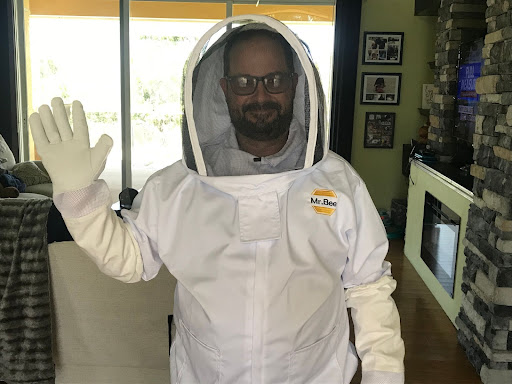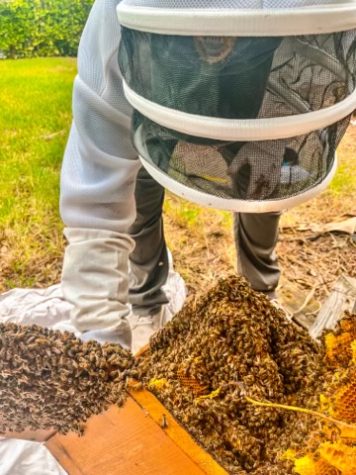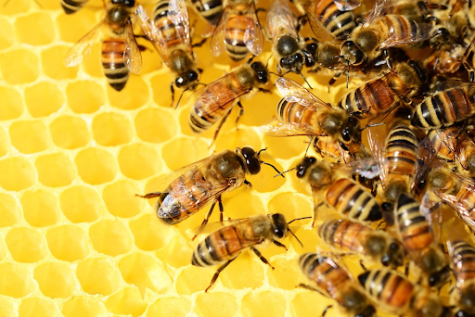Busy as a Bee

Local beekeeper Craig Tirrell discusses his beekeeping hobby in this feature.
Most people wouldn’t think of beekeeping as an accessible hobby that anyone can enjoy in their own backyard, but local beekeeper Craig Tirrell aims to disprove that rumor and show that this couldn’t be further from the truth. He, and many other beekeepers around the world have been keeping recreational hives of bees for years.

Tirrell indicated that his journey into beekeeping began coincidentally. “I had a friend who used to keep bees in his backyard. One day at work, we found a swarm on the property and he showed me how to catch and move the bees.”
“There were thousands of bees swirling around me, but I knew that none of them were there to harm me,” Tirrell stated. “From that moment, I was hooked.”
Only a few months after discovering this interest, he encountered an opportunity to learn more. “Soon after that, a swarm of bees showed up in my own front yard. Instead of hiring a professional to get rid of them, I got in touch with local beekeepers and started learning about how I could keep the bees and cultivate a hive myself.”
Tirrell further stated that “Like any pet, they require proper care and attention,” when discussing what kind of work goes into maintaining a bee hive. He explained that beekeepers perform weekly inspections to ensure that the hive is free from hazards such as invaders or disease, and emphasized that learning about how best to keep the hive safe from danger is the job of any good apiarist.
Of course, Tirrell was happy to explain the details of the sweetest part of the hobby – honey collection. He pointed out that local honey can taste much different than what shoppers can find at the supermarket. “Honey can vary greatly from region to region, and even from hive to hive,” he stated. “Some honey will be very light in color, and some will be dark. Some will taste more sweet, and others can taste a little spicy. All of this variation comes from what flowers the bees get their nectar from.” He continued, “Honey from the supermarket usually contains added sugar to create a higher yield, and the bees are often just fed sugar water in order to create a consistent product. However, the honey produced by a beekeeping hobbyist will take on the taste of local flowers within a four to five mile radius of your hive, which is how far bees can fly to find nectar.”
As for the taste of his bees’ honey, Tirrell added that, “My honey in particular usually tastes like the sweet jasmine flowers that I planted right next to their hive. That seems to be their favorite.”

Finally, Tirrell gave some advice about how interested individuals should get started. There’s a couple of really good starter books out there, and there might even be a local beekeeping club or group around.” He was quick to warn that starting a hive is a large commitment, and the hobbyist needs to be sure that there is a willingness to properly care for them before investing in any tools. After that, he said that a few things you may need are “a bee suit, a smoker, and some small brushes, among many other things.”
Tirrell mentioned that different kinds of starter hives can even be purchased online, but it is important to “research and decide what style fits” the prospective beekeeper best. Moreover, “there are ‘bee-boxes’ that allow you to simply provide a home for bees with no intent to harvest honey,” a potentially interesting alternative for environmentalists interested in helping foster local bee communities.
He elaborated further on how future beekeepers can acquire bees for their hives. “You can either capture a wild swarm (with proper help or experience), buy them from a local beekeeper, or even buy them online and they will be shipped to your home! This is called a ‘nuc’, and usually contains a queen bee, and a few male drones and worker bees. Simply add these to your bee hive, and the colony will grow in numbers from there with proper care.”
Craig Tirrell believes that anyone interested in beekeeping can and should try to get started. “Although I know it’s not for everyone,” he said, “as long as you are not allergic and have the confidence to work around them, then I think you would find it very rewarding, and it’s a great way to help the environment.”
Your donation will help support not only the student Journalism and Yearbook clubs at Marco Island Academy, but as well as any new equipment, club improvements, and annual website hosting costs.

Grant Tirrell is a senior at Marco Island Academy and the Web Layout and Opinions Editor for The Wave. In his time not spent working, he enjoys listening...












